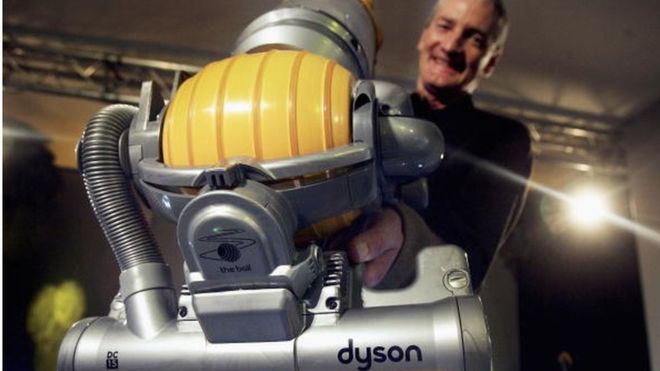
Sir James Dyson has won his appeal over a case that argues European suction tests favour his competitors’ vacuum cleaners. In 2015, he lost a major legal battle in his bid to prove the tests gave misleading higher efficiency ratings to rivals’ appliances. This successful appeal against that ruling will see the claim sent back to the original EU court for judgement. A spokesperson at Dyson said they were “shocked and delighted”.
Sir James, a high profile campaigner for Brexit, had previously argued that EU law discriminated in favour of his company’s rivals, which include Germany’s Bosch and Siemens. His argument rests on the fact that current EU efficiency tests deceive customers because they are conducted when the appliances are operated in “pristine” conditions in laboratories and do not test them in real conditions, where suction may be lost as the bag fills with dust. Sir James’s appliances are bagless and are sold as cleaners that do not lose suction as they fill up with dust, as do those that use a bag.
‘Historic win’
The European Court of Justice said rules on the efficiency of vacuum cleaners meant ratings should be based on how the devices were used in practice, not just in laboratories, and that the previous court hearing had not heard all the evidence supplied by Sir James at the time. One of Dyson’s contentions is that as rivals’ cleaners fill with dust, the wattage – used to measure energy efficiency – increases to double the starting level, meaning that appliances rated ‘A’ for efficiency end up as ‘D’ or even ‘E’.
Max Conze, chief executive of Dyson said: “This is a rare and historic win for consumers affirming Dyson’s view that testing must represent performance in the home.
“The European Commission stepped outside their legal framework to make this test irrelevant and misleading to consumers. Dyson was the only manufacturer to support a cap on motor wattage, the most effective way of reducing energy consumption, promoting greater efficiency. Dyson develops high performance machines for real in-home use.”
The original court ruling in 2015 did accept that “the suction performance and energy efficiency of a vacuum cleaner with a dust-loaded receptacle will be reduced due to dust accumulation” but threw out the case because Sir James could not suggest a new test with which he was happy.
Since September 2014, all vacuum cleaners sold in the EU have been subject to energy labelling requirements.
Will the ruling make any difference to consumers?
Brian Milligan, personal finance reporter
Buying a vacuum cleaner these days is a highly technical operation, possibly as complex as buying a car.
An EU efficiency label categorises each machine according to 6 different criteria: overall energy efficiency (on a scale of A to G); energy in Kwh; how loud it is; how good it is at retaining dust and minimising re-emissions; how efficient it is at picking up debris from a carpet; and how good it is at doing the same thing off a hardwood floor. While not many consumers may study the labels in detail, the manufacturers and the lawyers seem to be doing little else. In the battle of the vacuum cleaners, the labels are key. But will Dyson’s victory so far make much difference to consumers? Probably not. By the time Dyson eventually wins its case – if indeed it does – the models, and their labels, will all be different anyway.
Source bbc.co.uk




Be the first to comment